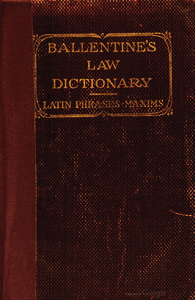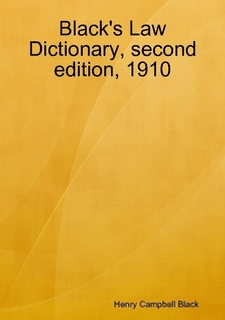The actual or implied receipt and retention of that which is tendered or offered. The acknowledgment of or assent to liability on a bill of exchange by the drawee. See 138 Am. St. Rep. 1102.
Definition of Acceptance
-
Ballentine's Law Dictionary
-
Black's Law Dictionary: 2nd Edition
The taking and receiving of anything in good part, and as it were a tacit agreement to a preceding act, which might have been defeated or avoided if such acceptance had not been made. Brooke, Abr. The act of a person to whom a thing is offered or tendered by another, whereby he receives the thing with the intention of retuin-ing it, such intention being evidenced by a sufficient act. The acceptance of goods sold under a contract which would be void by the statute of frauds without delivery and acceptance involves something more than the act of the vendor in the delivery. It requires that the vendee should also act, and that his act should be of such a nature as to indicate that he receives and acoepts the goods delivered as his property. He must receive and retain the articles delivered, intending thereby to assume the title to them, to constitute the acceptance mentioned in the statute. Rodgers v. Phillips, 40 N. Y. 524. See, also, Snow v. Warner, 10 Mete. (Mass.) 132, 43 Am. Dec. 417. In marine insurance, the acceptance of an abandonment by the underwriter is his assent, either express or to be implied from the surrounding circumstances, to the sufficiency and regularity of the abandonment. Its effect is to perfect the insured's right of action as for a total loss, if the cause of loss and circumstances have been truly disclosed. Rap. & Law. Acceptance of a hill of exchange. In mercantile law. The act by which the person on whom a bill of exchange is drawn (called the "drawee") assents to the request of the drawer to pay it, or, in other words, engages or makes himself liable, to pay it when due. 2 Bl Comm. 469; Cox v. National Bank, 100 U. S. 704, 25 In Ed. 739. It may be by parol or in writing, and either general or special, absolute or conditional; and it may be impliedly, as well as expressly, given. 8 Kent, Comm. 83, 85; Story, Bills, §§ 238, 251 But the usual and regular mode of acceptance is by the drawee's writing across the face of the bill the word "accepted," and subscribing his name; after which he is termed the acceptor. Id. § 243. The following are the principal varieties of acceptances: Absolute. An express and positive agreement to pay the bill according to its tenor. Conditional. An engagement to pay the bill on the happening of a condition. Todd v. Bank of Kentucky, 3 Bush (Ky ) 62S. Express. An absolute acceptance. Implied. An acceptance inferred by law from the acts or conduct of the drawee. Partial. An acceptance varying from the tenor of the bill. Qualified. One either conditional or partial, and which introduces a variation in the sum, time, mode, or place of payment. Supra protest. An acceptance by a third person, after protest of the bill for non-acceptance by the drawee, to save the honor of the drawer or some particular indorser. A general acceptance is an absolute acceptance precisely in conformity with the tenor of the bill itself, and not qualified by any statement, condition, or change. Rowe v. Young, 2 Brod. & B. 180; Todd v. Bank of Kentucky, 3 Bush (Ky.) 628 A special acceptance is the qualified acceptance of a bill of exchange, as where it is accepted as payable at a particular place "and not elsewhere." Rowe v. Young, 2 Brod. & B. 180.

